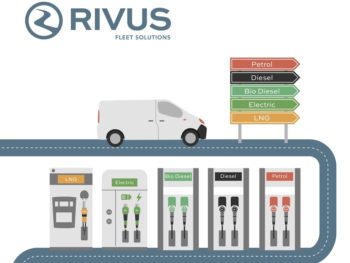Rivus Fleet Solutions, rebranded from BT Fleet Solutions following its recent acquisition, has once again teamed up with the AA to reveal the state of the fleet nation. Fleet World looks at some of the main findings from the 2019/20 Operational Fleet Insight.

Now in its fourth year, the 2019/20 report looks at the overall ‘pulse of the industry’, with a specific focus on how both diesel and electric vehicles are perceived in the industry and shows operators’ changing views on future usage of alternative fuel vehicles.
EVs/PHEVs top of mind and top of the list
As already revealed, diesel remains dominant for CV fleets, with 89% of fleets still using diesel in some capacity, compared to 87% last year. And 75% still expect to be using diesel in five years’ time.
But change is on the way. Fleet managers expect alternatively fuelled vehicles (AFVs) to become more widely adopted in future, in particular EVs and PHEVs. In the next five years, more than half (57%) expect to be using EVs compared with the 29% who are currently using EVs in their fleets. This compares with two-fifths of fleet managers who expect to be using PHEVs, contrasting with a quarter who are currently using hybrids.
Extending this out to a 10-year horizon, EVs remain dominant, with a third believing pure EVs and 27% PHEVs will be the most widely adopted in the long term. Other fuels, such as hydrogen, remain distant in fleet managers’ consideration as they try to gain more knowledge of this technology whilst understanding how EVs and PHEVs would work in their fleet context.
Remaining barriers to EVs
Some ongoing barriers to EV take-up remain but this year’s research also found that decision-makers are discovering new barriers or challenges they might face.
The report uncovered concerns about a lack of skilled engineers creating complication in assessing the SMR benefits of EVs. This is cited as an outright barrier to adopting EVs at the moment, by 13% of fleet managers.
Other details emerging include the need for multiple payment apps (10% of all decision-makers, rising to 15% of larger operators) and a lack of training on how to use EVs (10% rising to 19% for larger operators who seem more aware of the potential practical issues).
Alongside these new concerns, some more classic barriers remain. For example, around a third of fleet managers say that initial investment cost is a barrier to adopting EVs (36% of smaller fleets and 27% for larger operators).
V2G not yet generating interest – more education needed
With fleet managers still getting to grips with different alternative fuels and largely sticking to diesel for their commercial vehicles, it is perhaps not surprising that only 11% were aware of Vehicle to Grid (V2G) technology of EVs and PHEVs. This was higher among those with larger fleets where the fleet manager is perhaps more likely to be horizon-scanning, although this was still only a fifth (21%).
Once Rivus explained V2G to participants, a high proportion (71%) felt it would make them more likely to adopt EVs. This suggests there is a need for the industry to more effectively educate fleet decision-makers about the full implications and additional business benefits of operating EVs. This may go some way to balancing the disadvantages and limitations that fleet managers currently believe AFVs have compared with today’s cleaner diesels.
Pragmatism rules over Clean Air Zones
The Rivus/AA research found fleet managers are pro clean air, but pragmatic about planning for low-emission zones.
In general, fleet managers broadly support the Government’s clean air targets. They also feel that the automotive industry can play a significant part and that their businesses are fully behind the move to cleaner vehicles. This is especially the case for large fleets, where 82% support the introduction of ULEZs throughout the UK (compared with 72% on average). Only 11% of all fleet managers express a more active opposition to the expansion.
While supportive of their aims, trying to balance the short-term business needs and the relatively rapid introduction of Clean Air Zones means fleet managers need to be flexible in their operational approach.
A total of 23% of respondents have bought new lower-emission vehicles (e.g. Euro 6 diesels) and covered any additional cost within their fleet budget. However, rather than changing the composition of their fleets, around a quarter of fleet managers said they had just paid fines (23%) or moved older non-compliant vehicles elsewhere (25%).
And as fleet managers build planning for clean air zones into their business as usual operations, some uncertainty remains. For example, there is confusion around the application of penalty fines. Commercial-led fleets also expressed more frustration than car-led fleets when it comes to getting hold of information about the implications of Clean Air Zones (details, requirements, fines, etc.) on their fleets.
Car-led fleets particularly positive about driver benefits of EVs
The Rivus/AA research also explored drivers’ perspective on EVs, with the key insight being that the majority of fleet managers (73%) feel that EVs could be better for drivers’ health than diesel or petrol. The driver-related benefits of EVs often go unnoticed in that they are quieter, smoother, offer a calmer environment and encourage smoother driving, all of which combine to deliver better cost outcomes for businesses.
The research also found over half of all decision-makers (57%) think their drivers would prefer to drive an EV over petrol or diesel, with fleet managers who had EVs in their fleets talking positively about the feedback they had received from drivers.
To access the Rivus/AA 2019/20 Operational Fleet Insight in full, click here.

